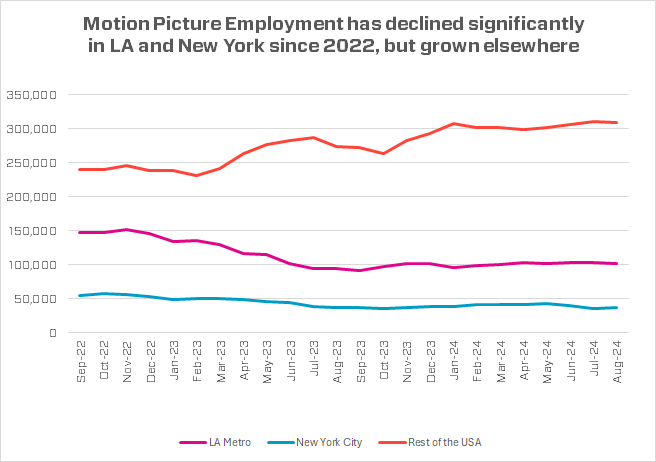The decline of Hollywood in one chart

Los Angeles is losing some ground as the center of the filmed-entertainment universe.
In recent years, the area has lost some TV and film jobs as countries such as Canada and states like Georgia have become production hubs.
LA’s share of US film and TV jobs dropped to 22% in August from about 33% two years earlier, found an analysis of new Bureau of Labor Statistics figures conducted by Patrick Adler and Taner Osman of Westwood Economics & Planning Associates. They also conducted research for an Otis College report from May on the creative economy, “Die Another Day.”

Los Angeles is losing TV and film jobs to the rest of the US.
The news isn’t great for New York, either.
The No. 2 entertainment-job market in the US (after LA) also saw its share of film and TV jobs dip. The rest of the country’s portion, meanwhile, rose to 69% from 54% two years earlier, the analysis found.
Overall TV and film employment in the US was generally flat during the same period at about 447,000, with the exception of a 10% decline during the writer and actor strikes, which largely shut down scripted production for much of 2023.
“There really is a rise of the rest,” Adler said. “You really didn’t see this in the jobs data until a little bit after the strikes. This is where things are really starting to pick up.”
There are a few theories for the shift, and unsurprisingly, they boil down to money.
Here are two:
- Producers are working with smaller budgets for shows and films as labor costs are up as a result of new union contracts, incentivizing filmmakers to leave LA for other places in the US (as well as overseas) where costs are lower and financial perks are better.
- LA’s cost of living could be driving people to find work in states where jobs have gotten more plentiful, thanks to generous film incentives in states such as Georgia or new ones recently passed by states including Arizona and Kentucky.
- Industry advocates are trying to boost California’s perks to lure more film and TV shoots, acknowledging the difficulty of competing with incentives offered elsewhere.
FilmLA suggested California’s film-incentive program could be improved, saying that one-fourth of TV-drama shoot days in the third quarter were on incentive-supported projects.
“California’s film incentive is a proven jobs creator that studies show provides a net positive return on every allocated dollar,” FilmLA’s president, Paul Audley, said. “What the program lacks is funding and eligibility criteria that reflect the outputs of the industry in 2024.”
LA’s entertainment industry isn’t just Hollywood, however. The city also has a rich base of other entertainment sectors, like gaming and social-media creation. Gaming, for example, was included in an employment category in Otis’ May study — “software publishing” — that rose 149% from 2013 to 2024.
And there’s no single city that’s on the verge of eclipsing LA’s TV and film output. But if the trend away from LA continues, as it has in recent months, it could mean Hollywood won’t be synonymous with TV and movies forever.






